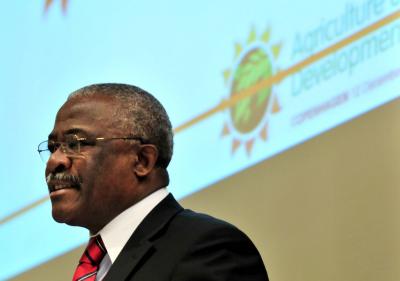Rural areas must play key role in Ebola recovery

ROME — The President of the International Fund for Agricultural Development (IFAD) said on Wednesday that plans for post-ebola recovery in Sierra Leone and Liberia will have to prioritise rural populations if the countries are to recover completely.
“Ebola has had a huge impact on life in rural areas - many of which are composed of small-time farmers who were unable to cultivate crops or earn a living during the epidemic,” said President Kanayo Nwanze. “If we don’t channel our investment into rural areas right now, these farmers might be forced to migrate in search of employment. In turn, this could compromise the future security of food supply in the two countries.”
During his visit to Sierra Leone, Nwanze will meet with President Ernest Bai Koroma, ministers of Agriculture, Finance and Equal Opportunies, as well as the Head of the Bank of Sierra Leone.
The President will then visit Liberia, where he will meet President Ellen Johnson Sirleaf, the Minister of Agriculture and the executive partners for the project.
Discussions will be centred around how IFAD will be able to best support the countries’ recovery plans after ebola.
The virus has killed over 11,000 people in the last two years in Guinea, Liberia and Sirrea Leone. The measures aimed at containing the epidemic, which included limiting movement, closing borders and imposing quarantines, meant that several markets had to close down, while agriculture and exportation declined in all three countries.
The projects financed by IFAD continued during the ebola crisis, and those participating in them were handed out prevention kits, seeds and fertiliser to help them grow their crops and feed their families.
While Sierra Leone’s commercial banks cut off their funding to rural areas during the epidemic, IFAD gave them financial support so they could continue providing financial services to health officials, state employees and teachers, allowing them to stay in infected areas and provide essential services.
Since the epidemic ended, IFAD has given these financial institutions a boost of 960,000 dollars to help small farmers gain back their livelihoods. It also gave the Liberian government 80,000 dollars to carry out a poll following up the epidemic, with the aim of finding out the best way of helping farmers back up on their feet.
The UN agency has also approved 41,6 million dollars in funding for two new projects to help the government recover.
“With over 70% of the rural population in these countries living off agriculture, our main interest is to ensure these farmers can have their own income so they can help rebuild their communities,” said Nwanze.
lej


